Entrepreneurship and Small Business Management
VerifiedAdded on 2023/01/12
|17
|4681
|43
AI Summary
This document discusses the different types of entrepreneurial ventures and their relationship with typologies of entrepreneurship. It also assesses the impact of micro and small businesses on the economy and explains the importance of small businesses and start-ups in the growth of the social economy.
Contribute Materials
Your contribution can guide someone’s learning journey. Share your
documents today.

ENTREPRENEURSHIP
AND SMALL
BUSINESS
MANAGEMENT
AND SMALL
BUSINESS
MANAGEMENT
Secure Best Marks with AI Grader
Need help grading? Try our AI Grader for instant feedback on your assignments.

Applied Corporate Strategy
Assessment Strategic Analysis
Report
Assessment Strategic Analysis
Report
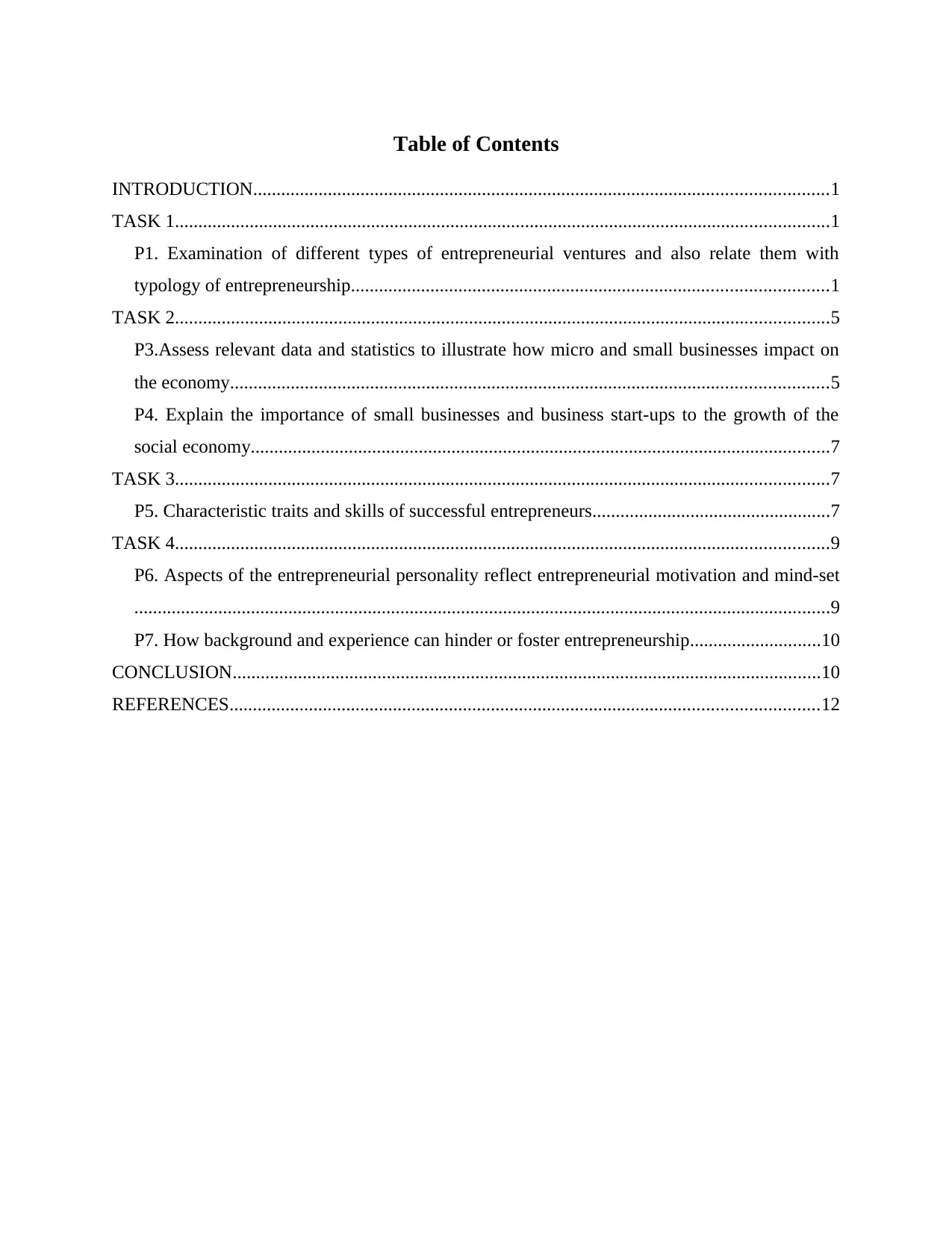
Table of Contents
INTRODUCTION...........................................................................................................................1
TASK 1............................................................................................................................................1
P1. Examination of different types of entrepreneurial ventures and also relate them with
typology of entrepreneurship......................................................................................................1
TASK 2............................................................................................................................................5
P3.Assess relevant data and statistics to illustrate how micro and small businesses impact on
the economy................................................................................................................................5
P4. Explain the importance of small businesses and business start-ups to the growth of the
social economy............................................................................................................................7
TASK 3............................................................................................................................................7
P5. Characteristic traits and skills of successful entrepreneurs...................................................7
TASK 4............................................................................................................................................9
P6. Aspects of the entrepreneurial personality reflect entrepreneurial motivation and mind-set
.....................................................................................................................................................9
P7. How background and experience can hinder or foster entrepreneurship............................10
CONCLUSION..............................................................................................................................10
REFERENCES..............................................................................................................................12
INTRODUCTION...........................................................................................................................1
TASK 1............................................................................................................................................1
P1. Examination of different types of entrepreneurial ventures and also relate them with
typology of entrepreneurship......................................................................................................1
TASK 2............................................................................................................................................5
P3.Assess relevant data and statistics to illustrate how micro and small businesses impact on
the economy................................................................................................................................5
P4. Explain the importance of small businesses and business start-ups to the growth of the
social economy............................................................................................................................7
TASK 3............................................................................................................................................7
P5. Characteristic traits and skills of successful entrepreneurs...................................................7
TASK 4............................................................................................................................................9
P6. Aspects of the entrepreneurial personality reflect entrepreneurial motivation and mind-set
.....................................................................................................................................................9
P7. How background and experience can hinder or foster entrepreneurship............................10
CONCLUSION..............................................................................................................................10
REFERENCES..............................................................................................................................12
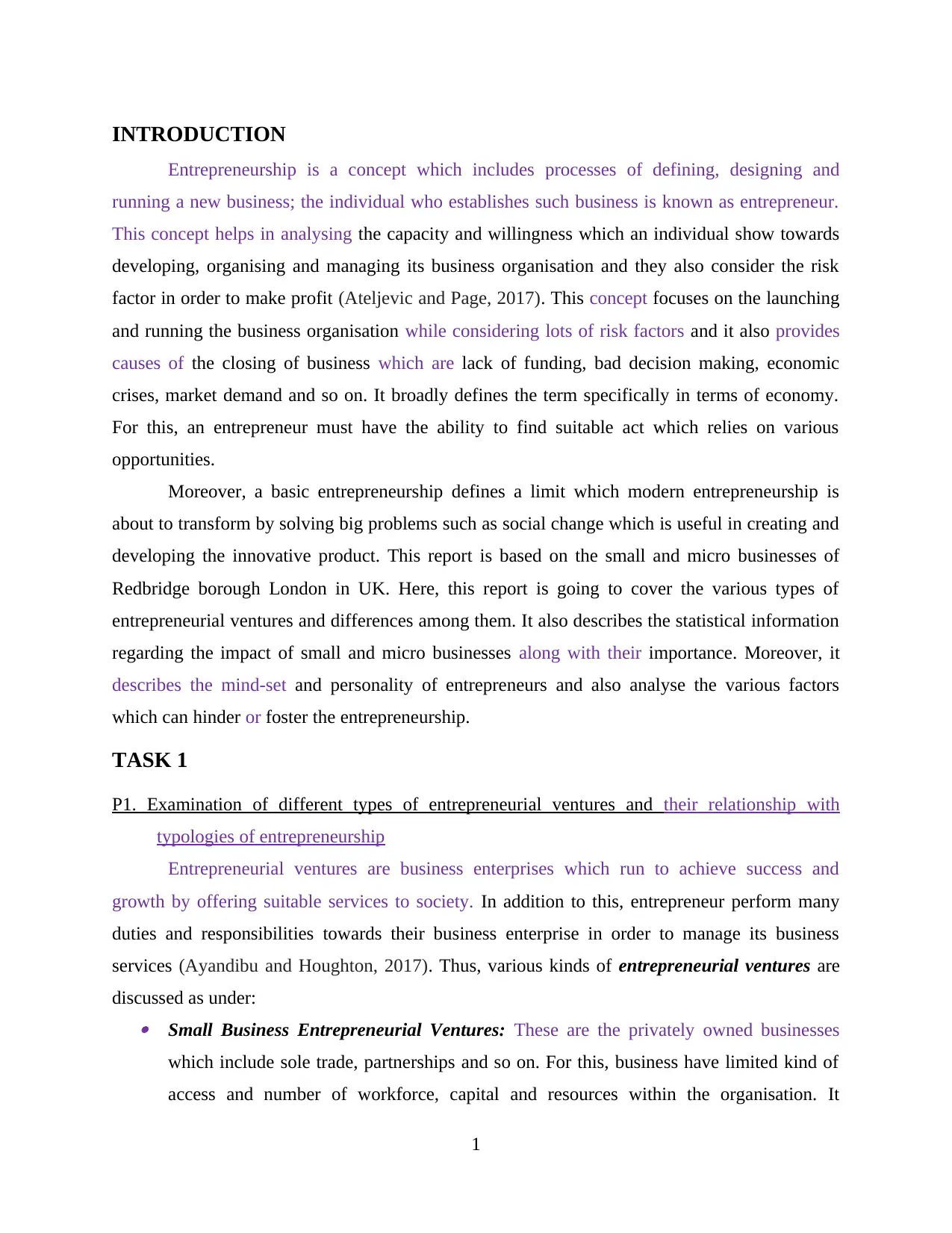
INTRODUCTION
Entrepreneurship is a concept which includes processes of defining, designing and
running a new business; the individual who establishes such business is known as entrepreneur.
This concept helps in analysing the capacity and willingness which an individual show towards
developing, organising and managing its business organisation and they also consider the risk
factor in order to make profit (Ateljevic and Page, 2017). This concept focuses on the launching
and running the business organisation while considering lots of risk factors and it also provides
causes of the closing of business which are lack of funding, bad decision making, economic
crises, market demand and so on. It broadly defines the term specifically in terms of economy.
For this, an entrepreneur must have the ability to find suitable act which relies on various
opportunities.
Moreover, a basic entrepreneurship defines a limit which modern entrepreneurship is
about to transform by solving big problems such as social change which is useful in creating and
developing the innovative product. This report is based on the small and micro businesses of
Redbridge borough London in UK. Here, this report is going to cover the various types of
entrepreneurial ventures and differences among them. It also describes the statistical information
regarding the impact of small and micro businesses along with their importance. Moreover, it
describes the mind-set and personality of entrepreneurs and also analyse the various factors
which can hinder or foster the entrepreneurship.
TASK 1
P1. Examination of different types of entrepreneurial ventures and their relationship with
typologies of entrepreneurship
Entrepreneurial ventures are business enterprises which run to achieve success and
growth by offering suitable services to society. In addition to this, entrepreneur perform many
duties and responsibilities towards their business enterprise in order to manage its business
services (Ayandibu and Houghton, 2017). Thus, various kinds of entrepreneurial ventures are
discussed as under: Small Business Entrepreneurial Ventures: These are the privately owned businesses
which include sole trade, partnerships and so on. For this, business have limited kind of
access and number of workforce, capital and resources within the organisation. It
1
Entrepreneurship is a concept which includes processes of defining, designing and
running a new business; the individual who establishes such business is known as entrepreneur.
This concept helps in analysing the capacity and willingness which an individual show towards
developing, organising and managing its business organisation and they also consider the risk
factor in order to make profit (Ateljevic and Page, 2017). This concept focuses on the launching
and running the business organisation while considering lots of risk factors and it also provides
causes of the closing of business which are lack of funding, bad decision making, economic
crises, market demand and so on. It broadly defines the term specifically in terms of economy.
For this, an entrepreneur must have the ability to find suitable act which relies on various
opportunities.
Moreover, a basic entrepreneurship defines a limit which modern entrepreneurship is
about to transform by solving big problems such as social change which is useful in creating and
developing the innovative product. This report is based on the small and micro businesses of
Redbridge borough London in UK. Here, this report is going to cover the various types of
entrepreneurial ventures and differences among them. It also describes the statistical information
regarding the impact of small and micro businesses along with their importance. Moreover, it
describes the mind-set and personality of entrepreneurs and also analyse the various factors
which can hinder or foster the entrepreneurship.
TASK 1
P1. Examination of different types of entrepreneurial ventures and their relationship with
typologies of entrepreneurship
Entrepreneurial ventures are business enterprises which run to achieve success and
growth by offering suitable services to society. In addition to this, entrepreneur perform many
duties and responsibilities towards their business enterprise in order to manage its business
services (Ayandibu and Houghton, 2017). Thus, various kinds of entrepreneurial ventures are
discussed as under: Small Business Entrepreneurial Ventures: These are the privately owned businesses
which include sole trade, partnerships and so on. For this, business have limited kind of
access and number of workforce, capital and resources within the organisation. It
1
Secure Best Marks with AI Grader
Need help grading? Try our AI Grader for instant feedback on your assignments.
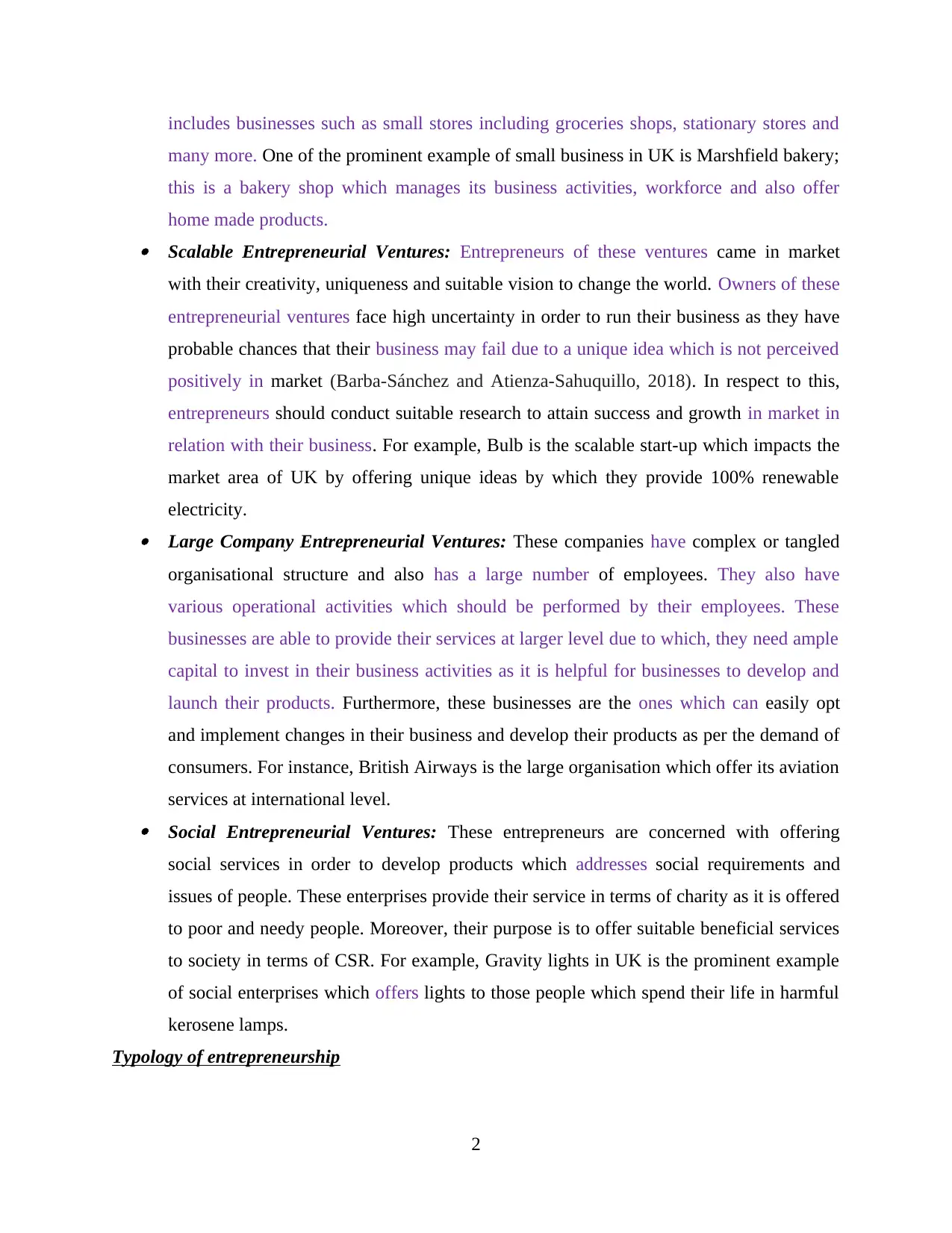
includes businesses such as small stores including groceries shops, stationary stores and
many more. One of the prominent example of small business in UK is Marshfield bakery;
this is a bakery shop which manages its business activities, workforce and also offer
home made products. Scalable Entrepreneurial Ventures: Entrepreneurs of these ventures came in market
with their creativity, uniqueness and suitable vision to change the world. Owners of these
entrepreneurial ventures face high uncertainty in order to run their business as they have
probable chances that their business may fail due to a unique idea which is not perceived
positively in market (Barba-Sánchez and Atienza-Sahuquillo, 2018). In respect to this,
entrepreneurs should conduct suitable research to attain success and growth in market in
relation with their business. For example, Bulb is the scalable start-up which impacts the
market area of UK by offering unique ideas by which they provide 100% renewable
electricity. Large Company Entrepreneurial Ventures: These companies have complex or tangled
organisational structure and also has a large number of employees. They also have
various operational activities which should be performed by their employees. These
businesses are able to provide their services at larger level due to which, they need ample
capital to invest in their business activities as it is helpful for businesses to develop and
launch their products. Furthermore, these businesses are the ones which can easily opt
and implement changes in their business and develop their products as per the demand of
consumers. For instance, British Airways is the large organisation which offer its aviation
services at international level. Social Entrepreneurial Ventures: These entrepreneurs are concerned with offering
social services in order to develop products which addresses social requirements and
issues of people. These enterprises provide their service in terms of charity as it is offered
to poor and needy people. Moreover, their purpose is to offer suitable beneficial services
to society in terms of CSR. For example, Gravity lights in UK is the prominent example
of social enterprises which offers lights to those people which spend their life in harmful
kerosene lamps.
Typology of entrepreneurship
2
many more. One of the prominent example of small business in UK is Marshfield bakery;
this is a bakery shop which manages its business activities, workforce and also offer
home made products. Scalable Entrepreneurial Ventures: Entrepreneurs of these ventures came in market
with their creativity, uniqueness and suitable vision to change the world. Owners of these
entrepreneurial ventures face high uncertainty in order to run their business as they have
probable chances that their business may fail due to a unique idea which is not perceived
positively in market (Barba-Sánchez and Atienza-Sahuquillo, 2018). In respect to this,
entrepreneurs should conduct suitable research to attain success and growth in market in
relation with their business. For example, Bulb is the scalable start-up which impacts the
market area of UK by offering unique ideas by which they provide 100% renewable
electricity. Large Company Entrepreneurial Ventures: These companies have complex or tangled
organisational structure and also has a large number of employees. They also have
various operational activities which should be performed by their employees. These
businesses are able to provide their services at larger level due to which, they need ample
capital to invest in their business activities as it is helpful for businesses to develop and
launch their products. Furthermore, these businesses are the ones which can easily opt
and implement changes in their business and develop their products as per the demand of
consumers. For instance, British Airways is the large organisation which offer its aviation
services at international level. Social Entrepreneurial Ventures: These entrepreneurs are concerned with offering
social services in order to develop products which addresses social requirements and
issues of people. These enterprises provide their service in terms of charity as it is offered
to poor and needy people. Moreover, their purpose is to offer suitable beneficial services
to society in terms of CSR. For example, Gravity lights in UK is the prominent example
of social enterprises which offers lights to those people which spend their life in harmful
kerosene lamps.
Typology of entrepreneurship
2
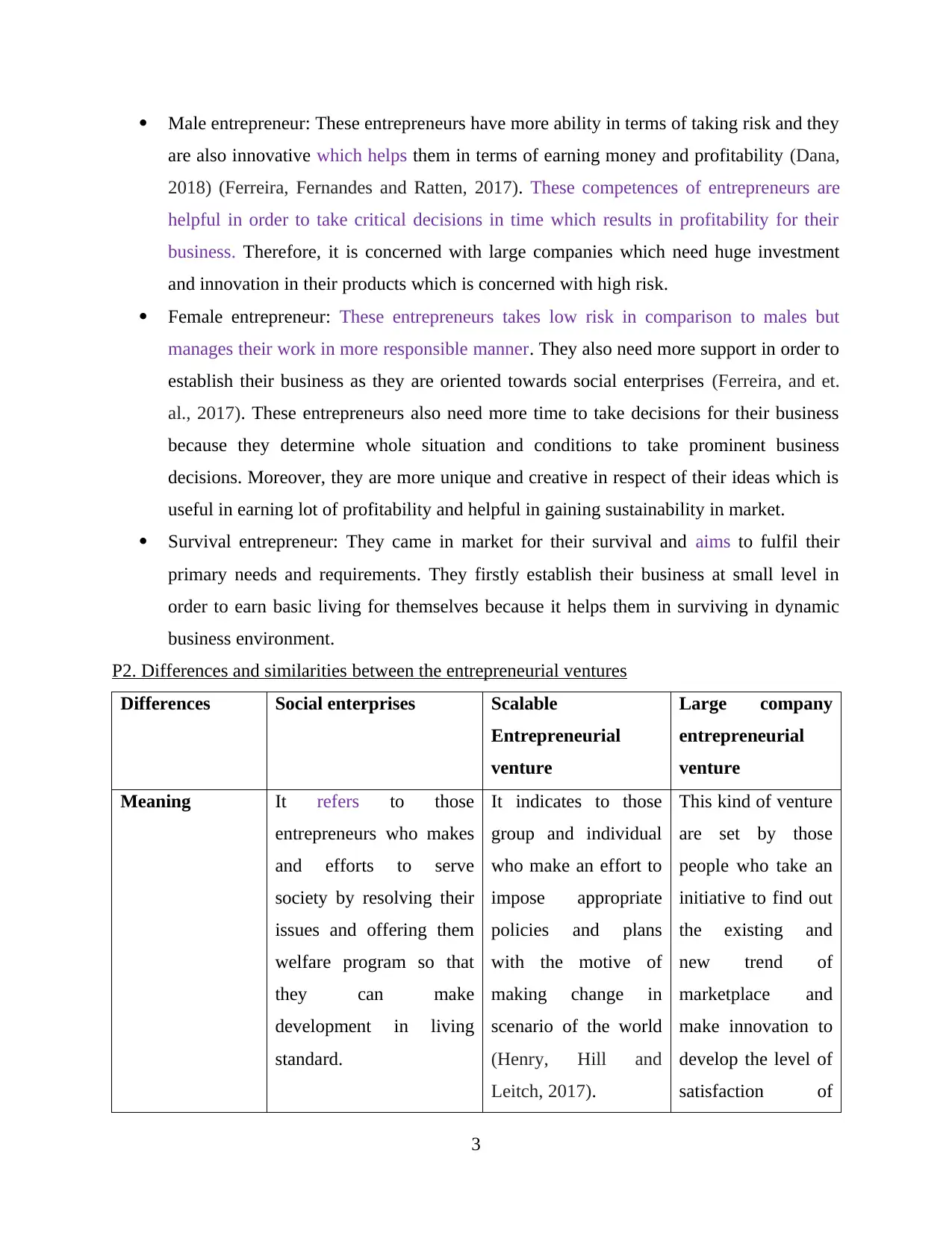
Male entrepreneur: These entrepreneurs have more ability in terms of taking risk and they
are also innovative which helps them in terms of earning money and profitability (Dana,
2018) (Ferreira, Fernandes and Ratten, 2017). These competences of entrepreneurs are
helpful in order to take critical decisions in time which results in profitability for their
business. Therefore, it is concerned with large companies which need huge investment
and innovation in their products which is concerned with high risk.
Female entrepreneur: These entrepreneurs takes low risk in comparison to males but
manages their work in more responsible manner. They also need more support in order to
establish their business as they are oriented towards social enterprises (Ferreira, and et.
al., 2017). These entrepreneurs also need more time to take decisions for their business
because they determine whole situation and conditions to take prominent business
decisions. Moreover, they are more unique and creative in respect of their ideas which is
useful in earning lot of profitability and helpful in gaining sustainability in market.
Survival entrepreneur: They came in market for their survival and aims to fulfil their
primary needs and requirements. They firstly establish their business at small level in
order to earn basic living for themselves because it helps them in surviving in dynamic
business environment.
P2. Differences and similarities between the entrepreneurial ventures
Differences Social enterprises Scalable
Entrepreneurial
venture
Large company
entrepreneurial
venture
Meaning It refers to those
entrepreneurs who makes
and efforts to serve
society by resolving their
issues and offering them
welfare program so that
they can make
development in living
standard.
It indicates to those
group and individual
who make an effort to
impose appropriate
policies and plans
with the motive of
making change in
scenario of the world
(Henry, Hill and
Leitch, 2017).
This kind of venture
are set by those
people who take an
initiative to find out
the existing and
new trend of
marketplace and
make innovation to
develop the level of
satisfaction of
3
are also innovative which helps them in terms of earning money and profitability (Dana,
2018) (Ferreira, Fernandes and Ratten, 2017). These competences of entrepreneurs are
helpful in order to take critical decisions in time which results in profitability for their
business. Therefore, it is concerned with large companies which need huge investment
and innovation in their products which is concerned with high risk.
Female entrepreneur: These entrepreneurs takes low risk in comparison to males but
manages their work in more responsible manner. They also need more support in order to
establish their business as they are oriented towards social enterprises (Ferreira, and et.
al., 2017). These entrepreneurs also need more time to take decisions for their business
because they determine whole situation and conditions to take prominent business
decisions. Moreover, they are more unique and creative in respect of their ideas which is
useful in earning lot of profitability and helpful in gaining sustainability in market.
Survival entrepreneur: They came in market for their survival and aims to fulfil their
primary needs and requirements. They firstly establish their business at small level in
order to earn basic living for themselves because it helps them in surviving in dynamic
business environment.
P2. Differences and similarities between the entrepreneurial ventures
Differences Social enterprises Scalable
Entrepreneurial
venture
Large company
entrepreneurial
venture
Meaning It refers to those
entrepreneurs who makes
and efforts to serve
society by resolving their
issues and offering them
welfare program so that
they can make
development in living
standard.
It indicates to those
group and individual
who make an effort to
impose appropriate
policies and plans
with the motive of
making change in
scenario of the world
(Henry, Hill and
Leitch, 2017).
This kind of venture
are set by those
people who take an
initiative to find out
the existing and
new trend of
marketplace and
make innovation to
develop the level of
satisfaction of
3
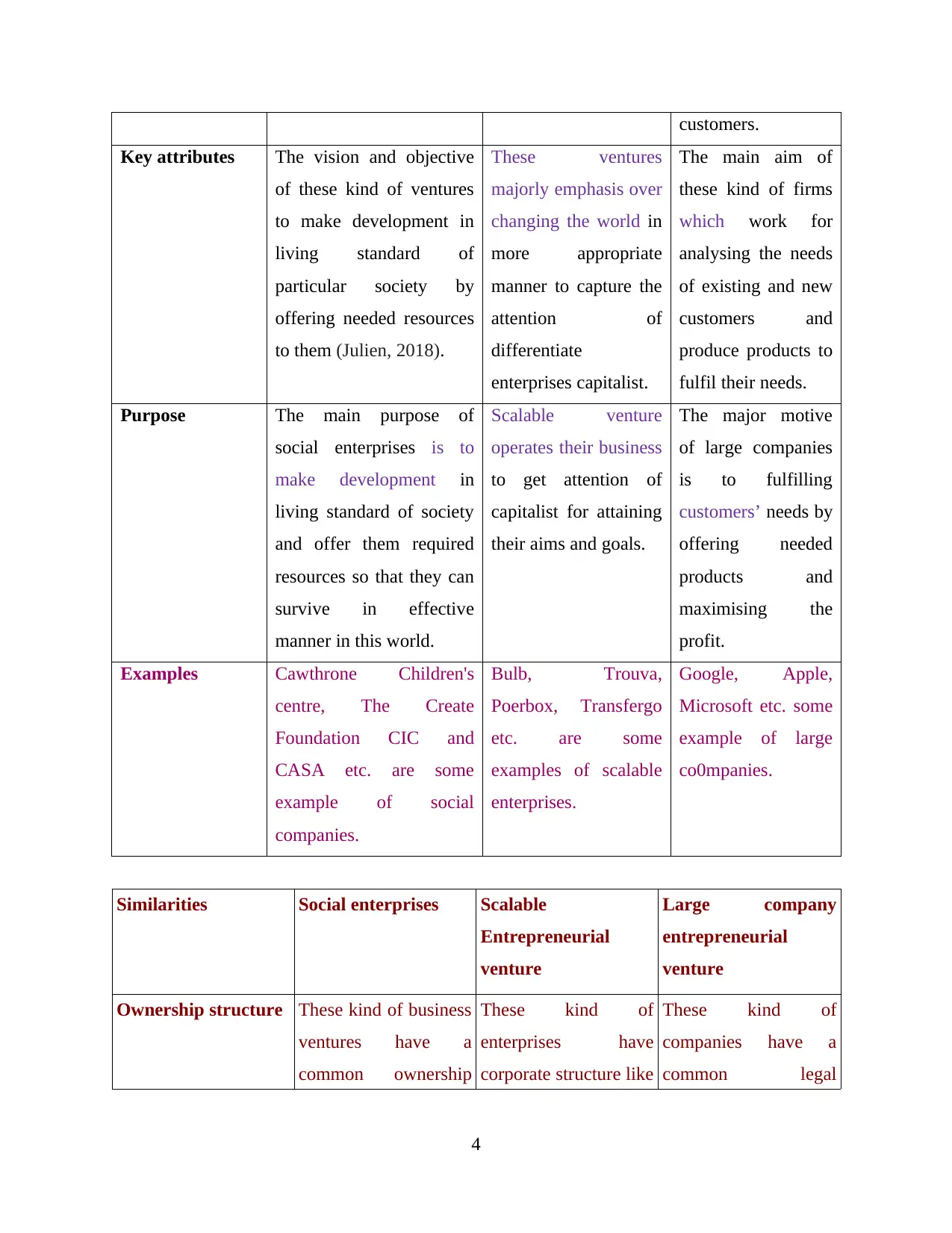
customers.
Key attributes The vision and objective
of these kind of ventures
to make development in
living standard of
particular society by
offering needed resources
to them (Julien, 2018).
These ventures
majorly emphasis over
changing the world in
more appropriate
manner to capture the
attention of
differentiate
enterprises capitalist.
The main aim of
these kind of firms
which work for
analysing the needs
of existing and new
customers and
produce products to
fulfil their needs.
Purpose The main purpose of
social enterprises is to
make development in
living standard of society
and offer them required
resources so that they can
survive in effective
manner in this world.
Scalable venture
operates their business
to get attention of
capitalist for attaining
their aims and goals.
The major motive
of large companies
is to fulfilling
customers’ needs by
offering needed
products and
maximising the
profit.
Examples Cawthrone Children's
centre, The Create
Foundation CIC and
CASA etc. are some
example of social
companies.
Bulb, Trouva,
Poerbox, Transfergo
etc. are some
examples of scalable
enterprises.
Google, Apple,
Microsoft etc. some
example of large
co0mpanies.
Similarities Social enterprises Scalable
Entrepreneurial
venture
Large company
entrepreneurial
venture
Ownership structure These kind of business
ventures have a
common ownership
These kind of
enterprises have
corporate structure like
These kind of
companies have a
common legal
4
Key attributes The vision and objective
of these kind of ventures
to make development in
living standard of
particular society by
offering needed resources
to them (Julien, 2018).
These ventures
majorly emphasis over
changing the world in
more appropriate
manner to capture the
attention of
differentiate
enterprises capitalist.
The main aim of
these kind of firms
which work for
analysing the needs
of existing and new
customers and
produce products to
fulfil their needs.
Purpose The main purpose of
social enterprises is to
make development in
living standard of society
and offer them required
resources so that they can
survive in effective
manner in this world.
Scalable venture
operates their business
to get attention of
capitalist for attaining
their aims and goals.
The major motive
of large companies
is to fulfilling
customers’ needs by
offering needed
products and
maximising the
profit.
Examples Cawthrone Children's
centre, The Create
Foundation CIC and
CASA etc. are some
example of social
companies.
Bulb, Trouva,
Poerbox, Transfergo
etc. are some
examples of scalable
enterprises.
Google, Apple,
Microsoft etc. some
example of large
co0mpanies.
Similarities Social enterprises Scalable
Entrepreneurial
venture
Large company
entrepreneurial
venture
Ownership structure These kind of business
ventures have a
common ownership
These kind of
enterprises have
corporate structure like
These kind of
companies have a
common legal
4
Paraphrase This Document
Need a fresh take? Get an instant paraphrase of this document with our AI Paraphraser
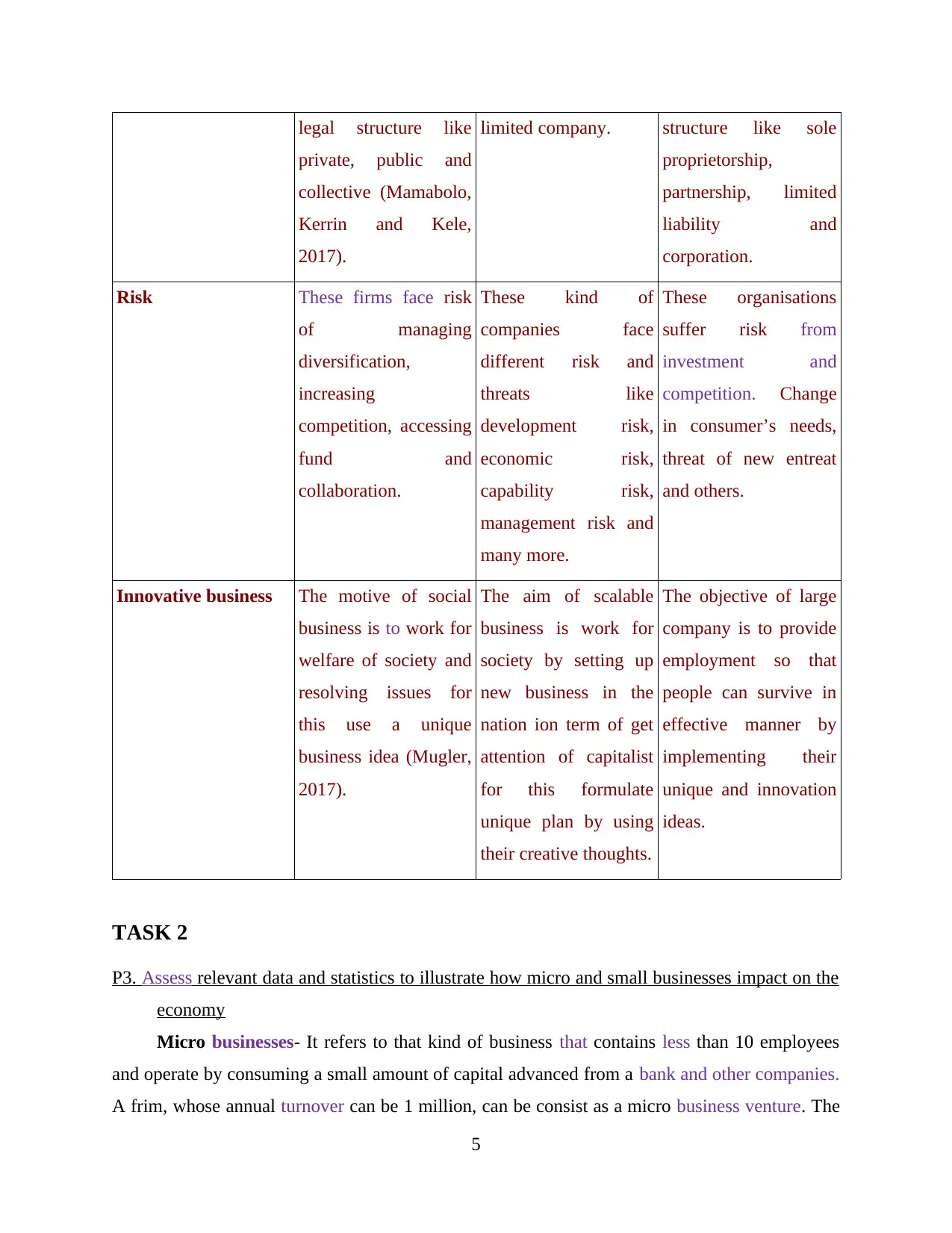
legal structure like
private, public and
collective (Mamabolo,
Kerrin and Kele,
2017).
limited company. structure like sole
proprietorship,
partnership, limited
liability and
corporation.
Risk These firms face risk
of managing
diversification,
increasing
competition, accessing
fund and
collaboration.
These kind of
companies face
different risk and
threats like
development risk,
economic risk,
capability risk,
management risk and
many more.
These organisations
suffer risk from
investment and
competition. Change
in consumer’s needs,
threat of new entreat
and others.
Innovative business The motive of social
business is to work for
welfare of society and
resolving issues for
this use a unique
business idea (Mugler,
2017).
The aim of scalable
business is work for
society by setting up
new business in the
nation ion term of get
attention of capitalist
for this formulate
unique plan by using
their creative thoughts.
The objective of large
company is to provide
employment so that
people can survive in
effective manner by
implementing their
unique and innovation
ideas.
TASK 2
P3. Assess relevant data and statistics to illustrate how micro and small businesses impact on the
economy
Micro businesses- It refers to that kind of business that contains less than 10 employees
and operate by consuming a small amount of capital advanced from a bank and other companies.
A frim, whose annual turnover can be 1 million, can be consist as a micro business venture. The
5
private, public and
collective (Mamabolo,
Kerrin and Kele,
2017).
limited company. structure like sole
proprietorship,
partnership, limited
liability and
corporation.
Risk These firms face risk
of managing
diversification,
increasing
competition, accessing
fund and
collaboration.
These kind of
companies face
different risk and
threats like
development risk,
economic risk,
capability risk,
management risk and
many more.
These organisations
suffer risk from
investment and
competition. Change
in consumer’s needs,
threat of new entreat
and others.
Innovative business The motive of social
business is to work for
welfare of society and
resolving issues for
this use a unique
business idea (Mugler,
2017).
The aim of scalable
business is work for
society by setting up
new business in the
nation ion term of get
attention of capitalist
for this formulate
unique plan by using
their creative thoughts.
The objective of large
company is to provide
employment so that
people can survive in
effective manner by
implementing their
unique and innovation
ideas.
TASK 2
P3. Assess relevant data and statistics to illustrate how micro and small businesses impact on the
economy
Micro businesses- It refers to that kind of business that contains less than 10 employees
and operate by consuming a small amount of capital advanced from a bank and other companies.
A frim, whose annual turnover can be 1 million, can be consist as a micro business venture. The
5
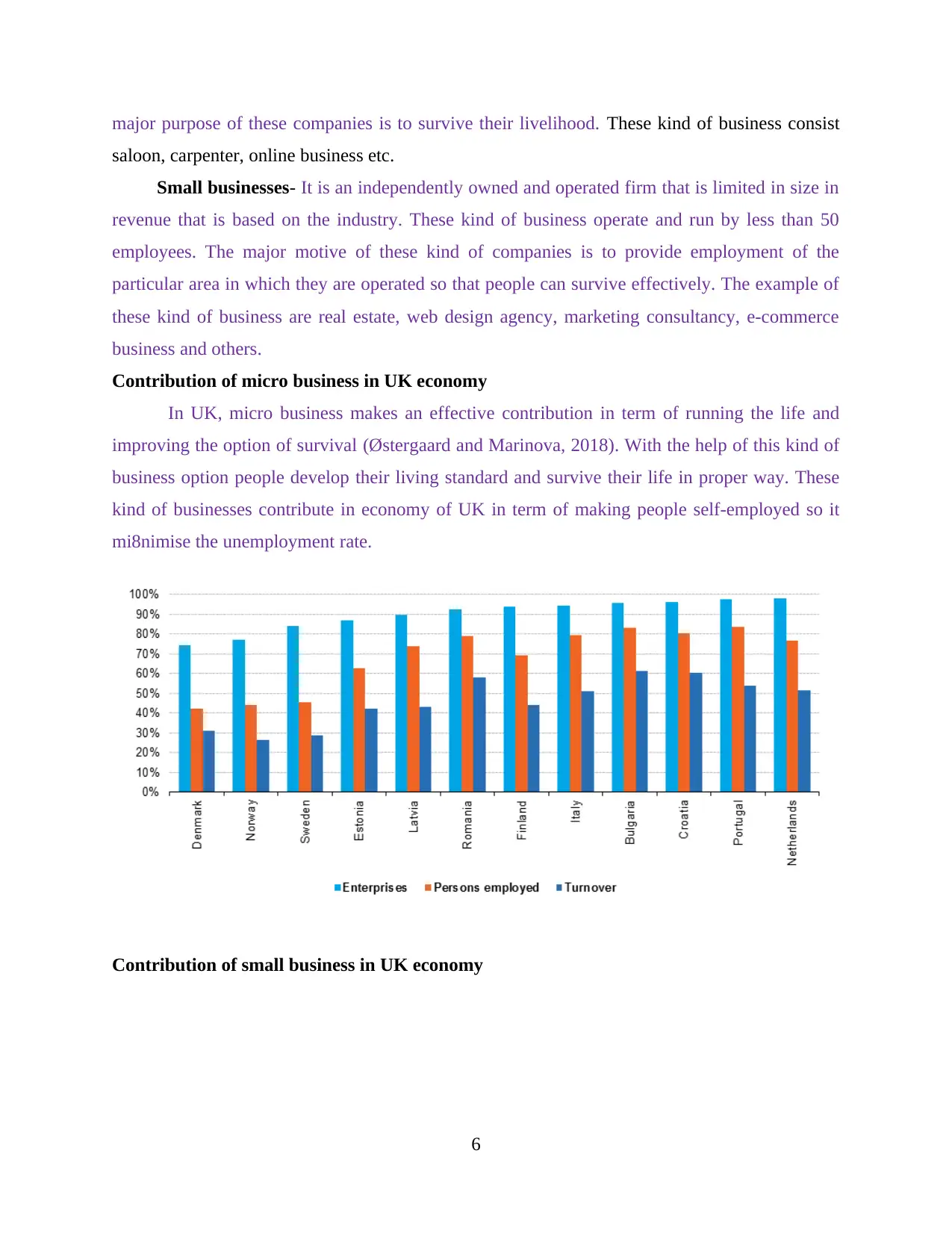
major purpose of these companies is to survive their livelihood. These kind of business consist
saloon, carpenter, online business etc.
Small businesses- It is an independently owned and operated firm that is limited in size in
revenue that is based on the industry. These kind of business operate and run by less than 50
employees. The major motive of these kind of companies is to provide employment of the
particular area in which they are operated so that people can survive effectively. The example of
these kind of business are real estate, web design agency, marketing consultancy, e-commerce
business and others.
Contribution of micro business in UK economy
In UK, micro business makes an effective contribution in term of running the life and
improving the option of survival (Østergaard and Marinova, 2018). With the help of this kind of
business option people develop their living standard and survive their life in proper way. These
kind of businesses contribute in economy of UK in term of making people self-employed so it
mi8nimise the unemployment rate.
Contribution of small business in UK economy
6
saloon, carpenter, online business etc.
Small businesses- It is an independently owned and operated firm that is limited in size in
revenue that is based on the industry. These kind of business operate and run by less than 50
employees. The major motive of these kind of companies is to provide employment of the
particular area in which they are operated so that people can survive effectively. The example of
these kind of business are real estate, web design agency, marketing consultancy, e-commerce
business and others.
Contribution of micro business in UK economy
In UK, micro business makes an effective contribution in term of running the life and
improving the option of survival (Østergaard and Marinova, 2018). With the help of this kind of
business option people develop their living standard and survive their life in proper way. These
kind of businesses contribute in economy of UK in term of making people self-employed so it
mi8nimise the unemployment rate.
Contribution of small business in UK economy
6
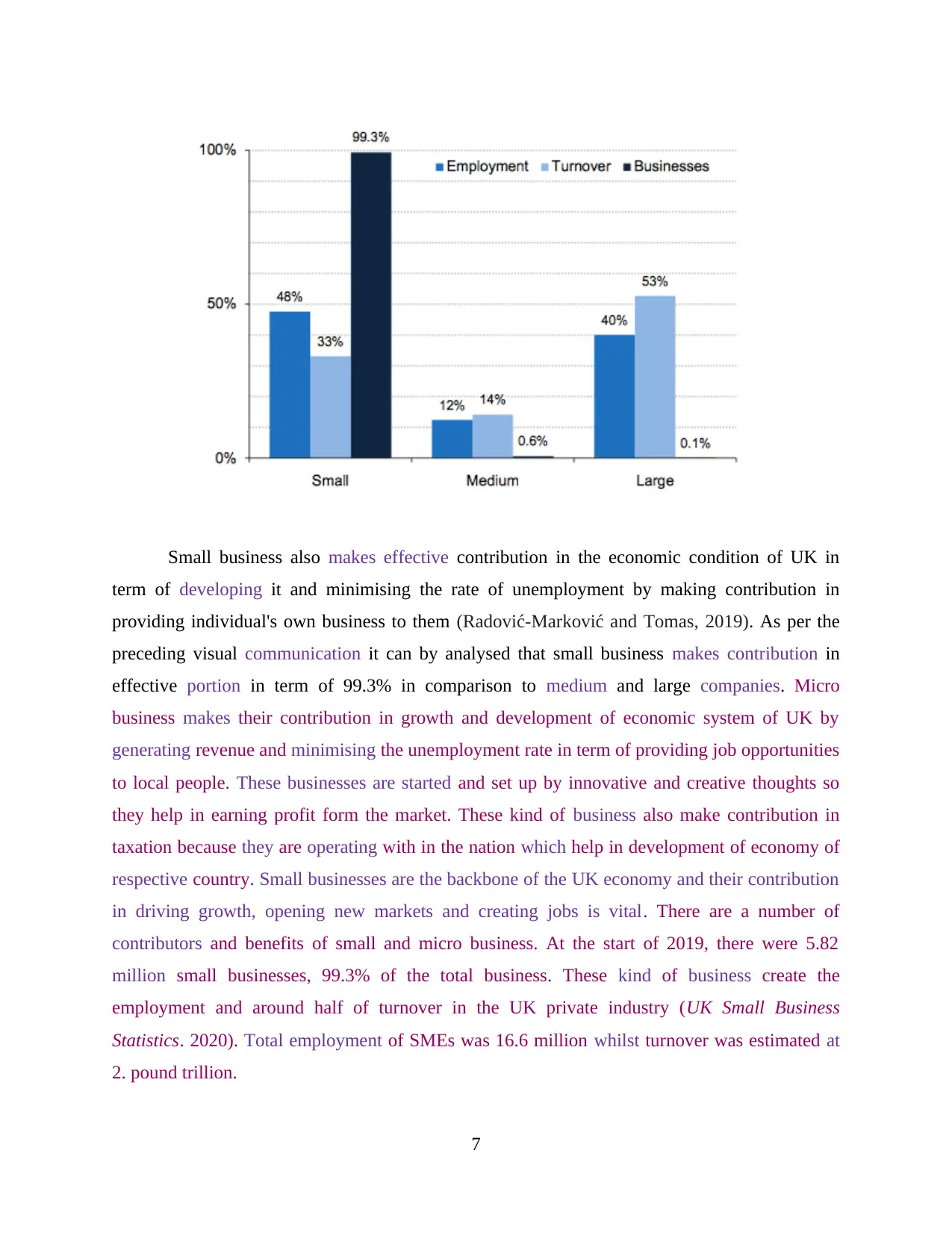
Small business also makes effective contribution in the economic condition of UK in
term of developing it and minimising the rate of unemployment by making contribution in
providing individual's own business to them (Radović-Marković and Tomas, 2019). As per the
preceding visual communication it can by analysed that small business makes contribution in
effective portion in term of 99.3% in comparison to medium and large companies. Micro
business makes their contribution in growth and development of economic system of UK by
generating revenue and minimising the unemployment rate in term of providing job opportunities
to local people. These businesses are started and set up by innovative and creative thoughts so
they help in earning profit form the market. These kind of business also make contribution in
taxation because they are operating with in the nation which help in development of economy of
respective country. Small businesses are the backbone of the UK economy and their contribution
in driving growth, opening new markets and creating jobs is vital. There are a number of
contributors and benefits of small and micro business. At the start of 2019, there were 5.82
million small businesses, 99.3% of the total business. These kind of business create the
employment and around half of turnover in the UK private industry (UK Small Business
Statistics. 2020). Total employment of SMEs was 16.6 million whilst turnover was estimated at
2. pound trillion.
7
term of developing it and minimising the rate of unemployment by making contribution in
providing individual's own business to them (Radović-Marković and Tomas, 2019). As per the
preceding visual communication it can by analysed that small business makes contribution in
effective portion in term of 99.3% in comparison to medium and large companies. Micro
business makes their contribution in growth and development of economic system of UK by
generating revenue and minimising the unemployment rate in term of providing job opportunities
to local people. These businesses are started and set up by innovative and creative thoughts so
they help in earning profit form the market. These kind of business also make contribution in
taxation because they are operating with in the nation which help in development of economy of
respective country. Small businesses are the backbone of the UK economy and their contribution
in driving growth, opening new markets and creating jobs is vital. There are a number of
contributors and benefits of small and micro business. At the start of 2019, there were 5.82
million small businesses, 99.3% of the total business. These kind of business create the
employment and around half of turnover in the UK private industry (UK Small Business
Statistics. 2020). Total employment of SMEs was 16.6 million whilst turnover was estimated at
2. pound trillion.
7
Secure Best Marks with AI Grader
Need help grading? Try our AI Grader for instant feedback on your assignments.
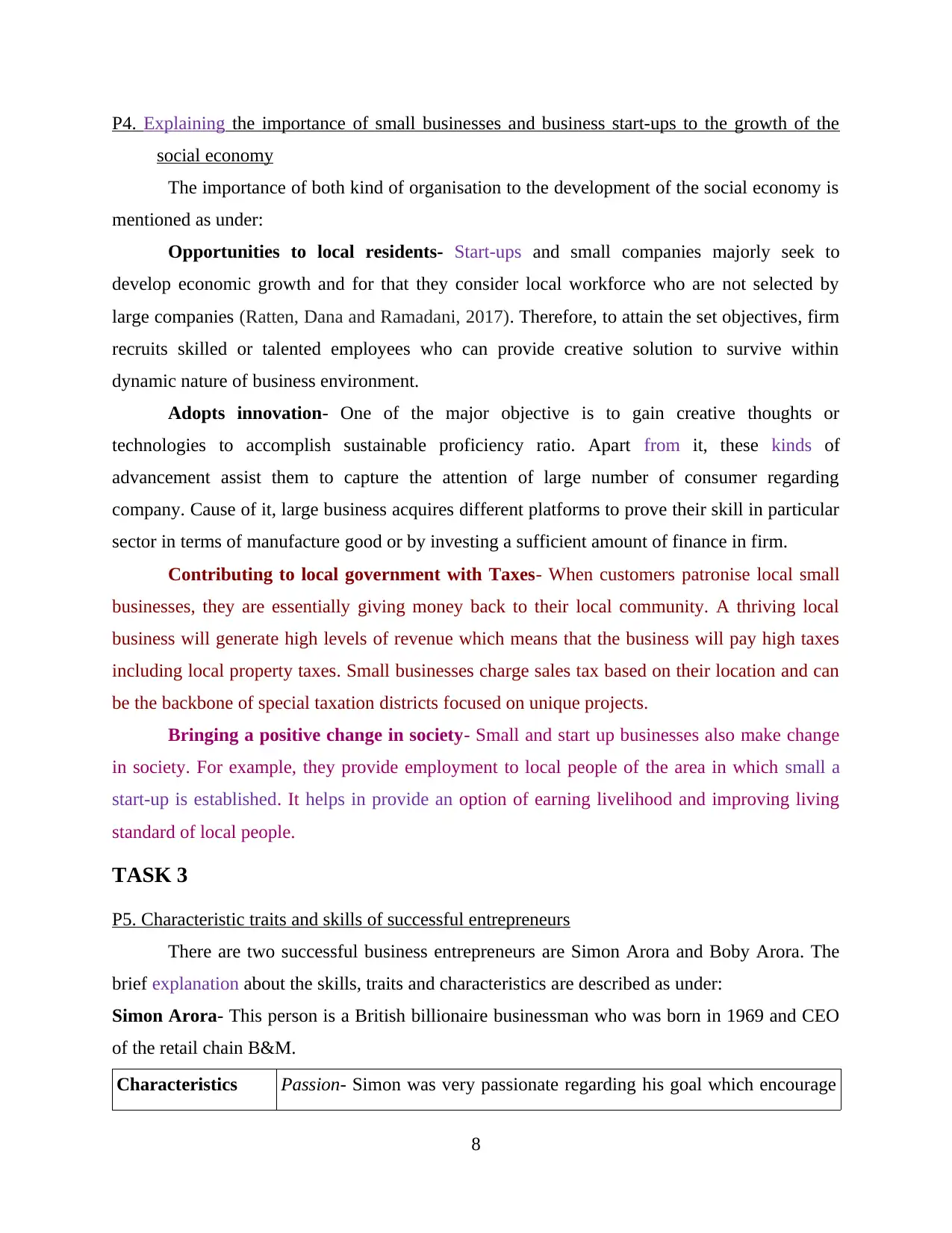
P4. Explaining the importance of small businesses and business start-ups to the growth of the
social economy
The importance of both kind of organisation to the development of the social economy is
mentioned as under:
Opportunities to local residents- Start-ups and small companies majorly seek to
develop economic growth and for that they consider local workforce who are not selected by
large companies (Ratten, Dana and Ramadani, 2017). Therefore, to attain the set objectives, firm
recruits skilled or talented employees who can provide creative solution to survive within
dynamic nature of business environment.
Adopts innovation- One of the major objective is to gain creative thoughts or
technologies to accomplish sustainable proficiency ratio. Apart from it, these kinds of
advancement assist them to capture the attention of large number of consumer regarding
company. Cause of it, large business acquires different platforms to prove their skill in particular
sector in terms of manufacture good or by investing a sufficient amount of finance in firm.
Contributing to local government with Taxes- When customers patronise local small
businesses, they are essentially giving money back to their local community. A thriving local
business will generate high levels of revenue which means that the business will pay high taxes
including local property taxes. Small businesses charge sales tax based on their location and can
be the backbone of special taxation districts focused on unique projects.
Bringing a positive change in society- Small and start up businesses also make change
in society. For example, they provide employment to local people of the area in which small a
start-up is established. It helps in provide an option of earning livelihood and improving living
standard of local people.
TASK 3
P5. Characteristic traits and skills of successful entrepreneurs
There are two successful business entrepreneurs are Simon Arora and Boby Arora. The
brief explanation about the skills, traits and characteristics are described as under:
Simon Arora- This person is a British billionaire businessman who was born in 1969 and CEO
of the retail chain B&M.
Characteristics Passion- Simon was very passionate regarding his goal which encourage
8
social economy
The importance of both kind of organisation to the development of the social economy is
mentioned as under:
Opportunities to local residents- Start-ups and small companies majorly seek to
develop economic growth and for that they consider local workforce who are not selected by
large companies (Ratten, Dana and Ramadani, 2017). Therefore, to attain the set objectives, firm
recruits skilled or talented employees who can provide creative solution to survive within
dynamic nature of business environment.
Adopts innovation- One of the major objective is to gain creative thoughts or
technologies to accomplish sustainable proficiency ratio. Apart from it, these kinds of
advancement assist them to capture the attention of large number of consumer regarding
company. Cause of it, large business acquires different platforms to prove their skill in particular
sector in terms of manufacture good or by investing a sufficient amount of finance in firm.
Contributing to local government with Taxes- When customers patronise local small
businesses, they are essentially giving money back to their local community. A thriving local
business will generate high levels of revenue which means that the business will pay high taxes
including local property taxes. Small businesses charge sales tax based on their location and can
be the backbone of special taxation districts focused on unique projects.
Bringing a positive change in society- Small and start up businesses also make change
in society. For example, they provide employment to local people of the area in which small a
start-up is established. It helps in provide an option of earning livelihood and improving living
standard of local people.
TASK 3
P5. Characteristic traits and skills of successful entrepreneurs
There are two successful business entrepreneurs are Simon Arora and Boby Arora. The
brief explanation about the skills, traits and characteristics are described as under:
Simon Arora- This person is a British billionaire businessman who was born in 1969 and CEO
of the retail chain B&M.
Characteristics Passion- Simon was very passionate regarding his goal which encourage
8
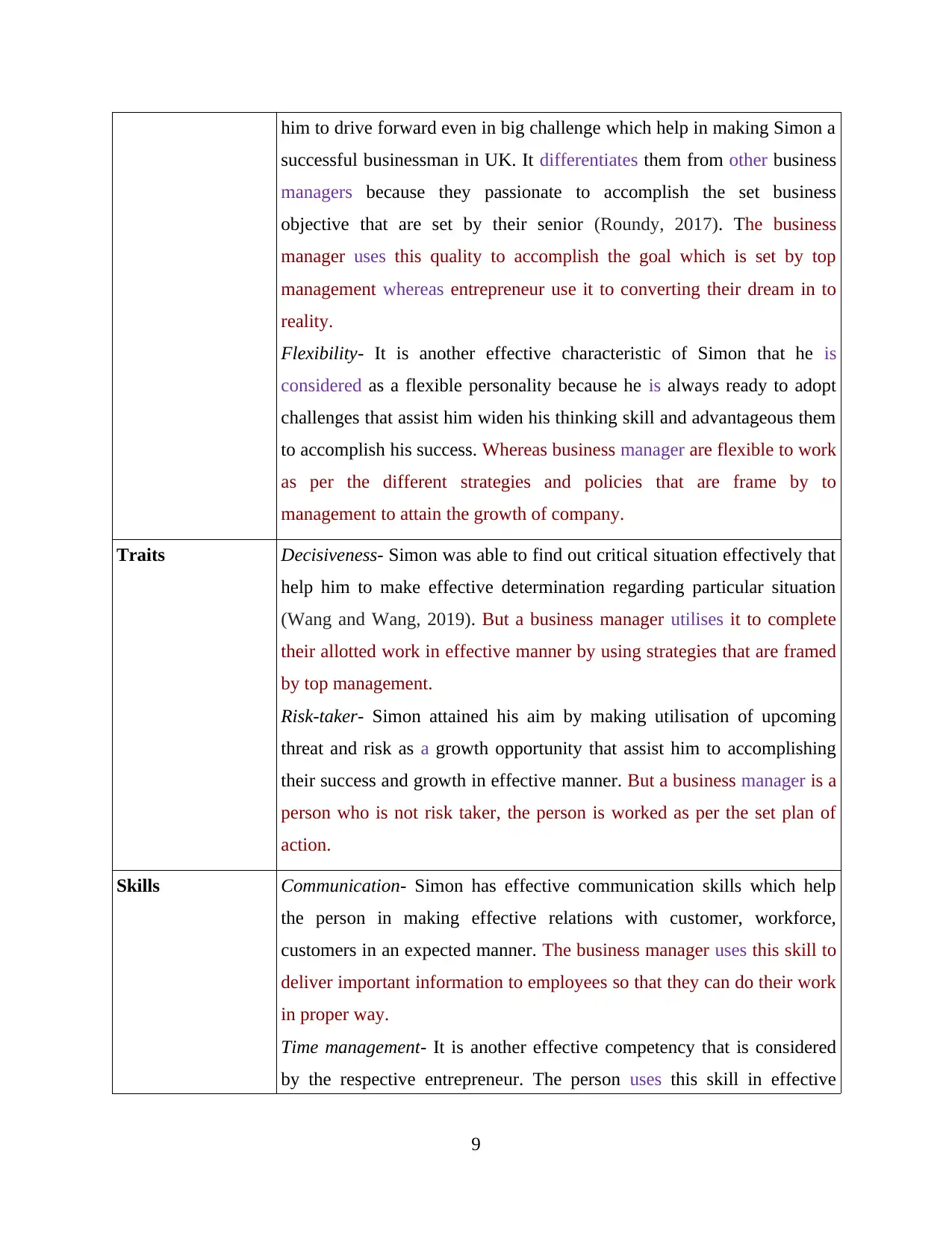
him to drive forward even in big challenge which help in making Simon a
successful businessman in UK. It differentiates them from other business
managers because they passionate to accomplish the set business
objective that are set by their senior (Roundy, 2017). The business
manager uses this quality to accomplish the goal which is set by top
management whereas entrepreneur use it to converting their dream in to
reality.
Flexibility- It is another effective characteristic of Simon that he is
considered as a flexible personality because he is always ready to adopt
challenges that assist him widen his thinking skill and advantageous them
to accomplish his success. Whereas business manager are flexible to work
as per the different strategies and policies that are frame by to
management to attain the growth of company.
Traits Decisiveness- Simon was able to find out critical situation effectively that
help him to make effective determination regarding particular situation
(Wang and Wang, 2019). But a business manager utilises it to complete
their allotted work in effective manner by using strategies that are framed
by top management.
Risk-taker- Simon attained his aim by making utilisation of upcoming
threat and risk as a growth opportunity that assist him to accomplishing
their success and growth in effective manner. But a business manager is a
person who is not risk taker, the person is worked as per the set plan of
action.
Skills Communication- Simon has effective communication skills which help
the person in making effective relations with customer, workforce,
customers in an expected manner. The business manager uses this skill to
deliver important information to employees so that they can do their work
in proper way.
Time management- It is another effective competency that is considered
by the respective entrepreneur. The person uses this skill in effective
9
successful businessman in UK. It differentiates them from other business
managers because they passionate to accomplish the set business
objective that are set by their senior (Roundy, 2017). The business
manager uses this quality to accomplish the goal which is set by top
management whereas entrepreneur use it to converting their dream in to
reality.
Flexibility- It is another effective characteristic of Simon that he is
considered as a flexible personality because he is always ready to adopt
challenges that assist him widen his thinking skill and advantageous them
to accomplish his success. Whereas business manager are flexible to work
as per the different strategies and policies that are frame by to
management to attain the growth of company.
Traits Decisiveness- Simon was able to find out critical situation effectively that
help him to make effective determination regarding particular situation
(Wang and Wang, 2019). But a business manager utilises it to complete
their allotted work in effective manner by using strategies that are framed
by top management.
Risk-taker- Simon attained his aim by making utilisation of upcoming
threat and risk as a growth opportunity that assist him to accomplishing
their success and growth in effective manner. But a business manager is a
person who is not risk taker, the person is worked as per the set plan of
action.
Skills Communication- Simon has effective communication skills which help
the person in making effective relations with customer, workforce,
customers in an expected manner. The business manager uses this skill to
deliver important information to employees so that they can do their work
in proper way.
Time management- It is another effective competency that is considered
by the respective entrepreneur. The person uses this skill in effective
9
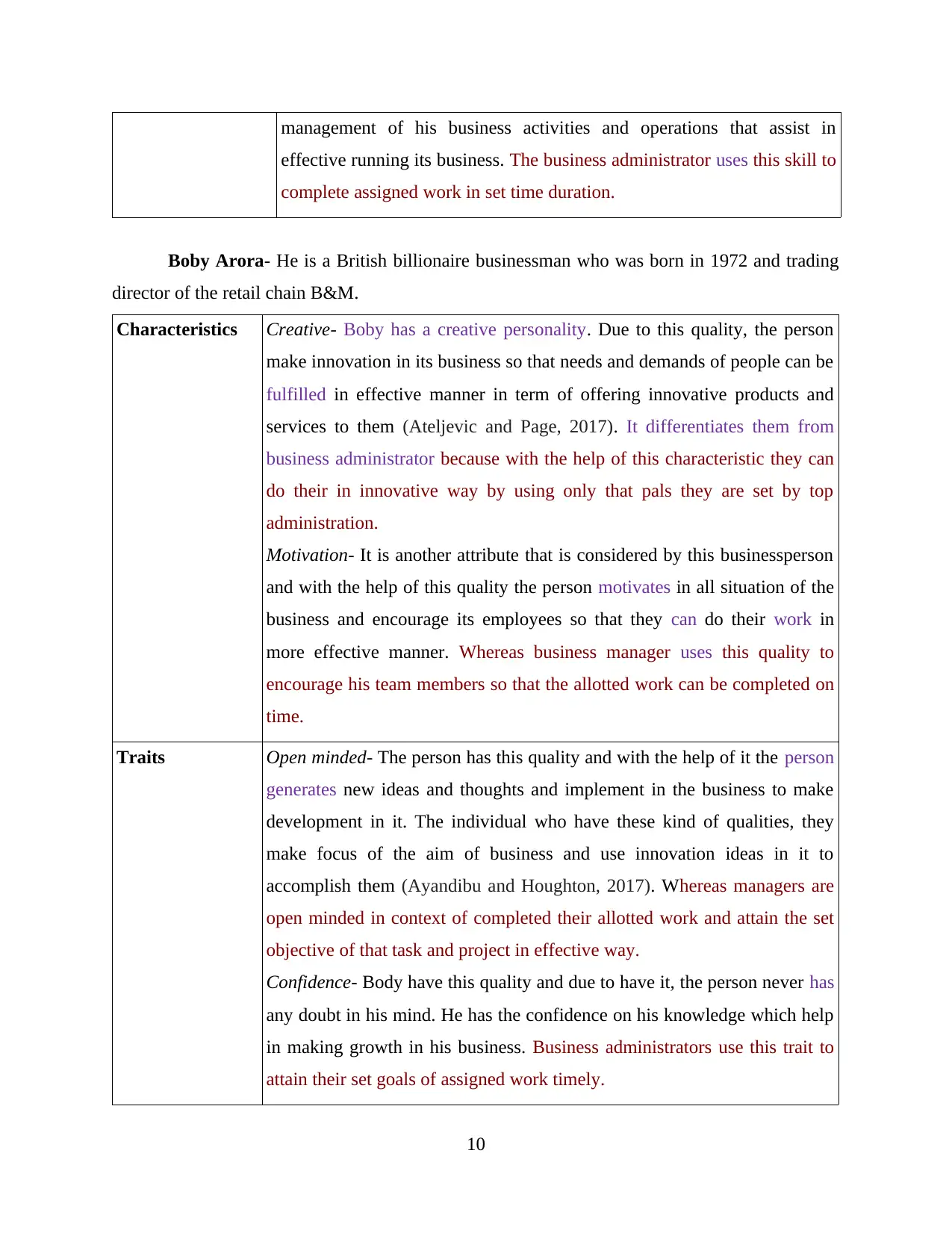
management of his business activities and operations that assist in
effective running its business. The business administrator uses this skill to
complete assigned work in set time duration.
Boby Arora- He is a British billionaire businessman who was born in 1972 and trading
director of the retail chain B&M.
Characteristics Creative- Boby has a creative personality. Due to this quality, the person
make innovation in its business so that needs and demands of people can be
fulfilled in effective manner in term of offering innovative products and
services to them (Ateljevic and Page, 2017). It differentiates them from
business administrator because with the help of this characteristic they can
do their in innovative way by using only that pals they are set by top
administration.
Motivation- It is another attribute that is considered by this businessperson
and with the help of this quality the person motivates in all situation of the
business and encourage its employees so that they can do their work in
more effective manner. Whereas business manager uses this quality to
encourage his team members so that the allotted work can be completed on
time.
Traits Open minded- The person has this quality and with the help of it the person
generates new ideas and thoughts and implement in the business to make
development in it. The individual who have these kind of qualities, they
make focus of the aim of business and use innovation ideas in it to
accomplish them (Ayandibu and Houghton, 2017). Whereas managers are
open minded in context of completed their allotted work and attain the set
objective of that task and project in effective way.
Confidence- Body have this quality and due to have it, the person never has
any doubt in his mind. He has the confidence on his knowledge which help
in making growth in his business. Business administrators use this trait to
attain their set goals of assigned work timely.
10
effective running its business. The business administrator uses this skill to
complete assigned work in set time duration.
Boby Arora- He is a British billionaire businessman who was born in 1972 and trading
director of the retail chain B&M.
Characteristics Creative- Boby has a creative personality. Due to this quality, the person
make innovation in its business so that needs and demands of people can be
fulfilled in effective manner in term of offering innovative products and
services to them (Ateljevic and Page, 2017). It differentiates them from
business administrator because with the help of this characteristic they can
do their in innovative way by using only that pals they are set by top
administration.
Motivation- It is another attribute that is considered by this businessperson
and with the help of this quality the person motivates in all situation of the
business and encourage its employees so that they can do their work in
more effective manner. Whereas business manager uses this quality to
encourage his team members so that the allotted work can be completed on
time.
Traits Open minded- The person has this quality and with the help of it the person
generates new ideas and thoughts and implement in the business to make
development in it. The individual who have these kind of qualities, they
make focus of the aim of business and use innovation ideas in it to
accomplish them (Ayandibu and Houghton, 2017). Whereas managers are
open minded in context of completed their allotted work and attain the set
objective of that task and project in effective way.
Confidence- Body have this quality and due to have it, the person never has
any doubt in his mind. He has the confidence on his knowledge which help
in making growth in his business. Business administrators use this trait to
attain their set goals of assigned work timely.
10
Paraphrase This Document
Need a fresh take? Get an instant paraphrase of this document with our AI Paraphraser
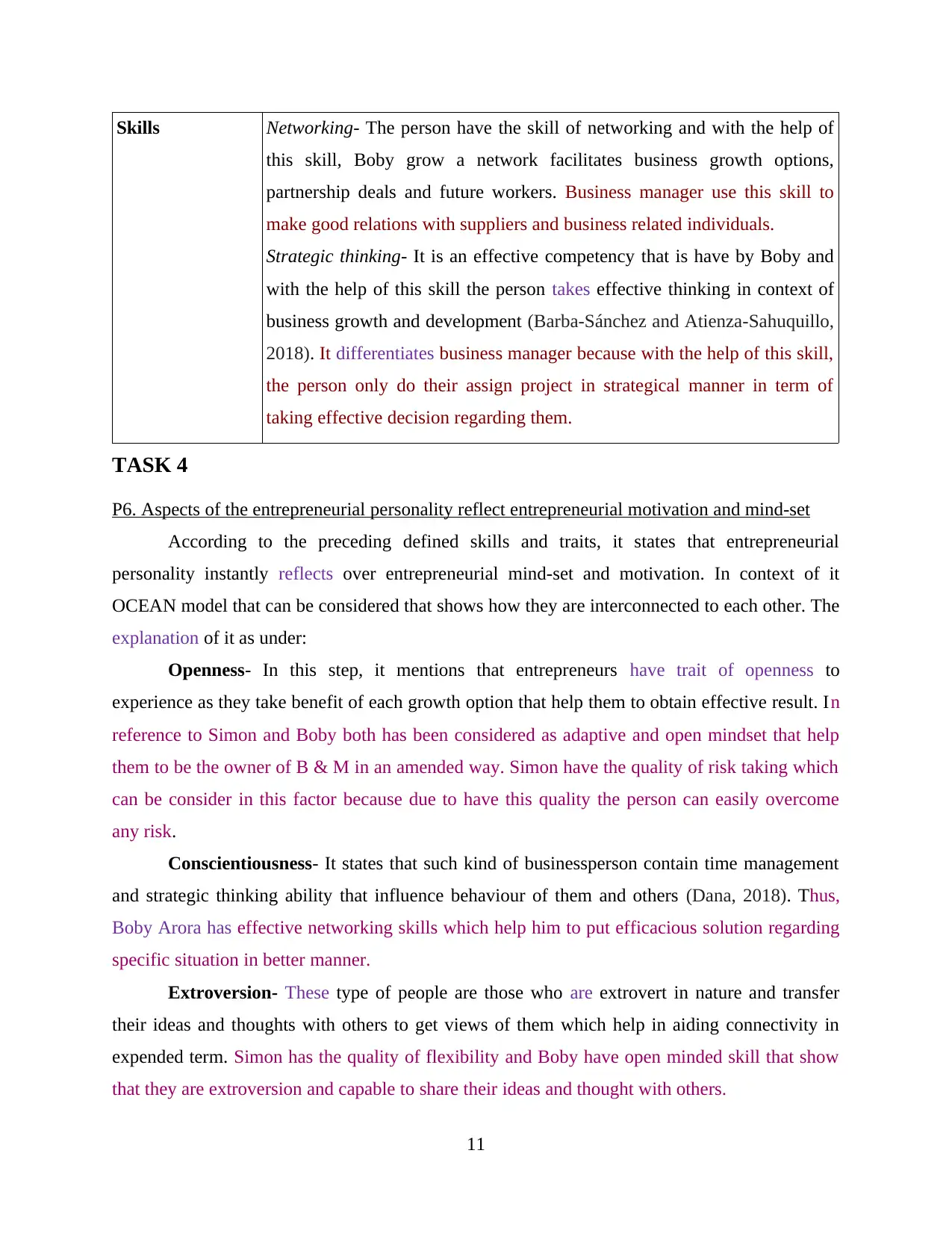
Skills Networking- The person have the skill of networking and with the help of
this skill, Boby grow a network facilitates business growth options,
partnership deals and future workers. Business manager use this skill to
make good relations with suppliers and business related individuals.
Strategic thinking- It is an effective competency that is have by Boby and
with the help of this skill the person takes effective thinking in context of
business growth and development (Barba-Sánchez and Atienza-Sahuquillo,
2018). It differentiates business manager because with the help of this skill,
the person only do their assign project in strategical manner in term of
taking effective decision regarding them.
TASK 4
P6. Aspects of the entrepreneurial personality reflect entrepreneurial motivation and mind-set
According to the preceding defined skills and traits, it states that entrepreneurial
personality instantly reflects over entrepreneurial mind-set and motivation. In context of it
OCEAN model that can be considered that shows how they are interconnected to each other. The
explanation of it as under:
Openness- In this step, it mentions that entrepreneurs have trait of openness to
experience as they take benefit of each growth option that help them to obtain effective result. In
reference to Simon and Boby both has been considered as adaptive and open mindset that help
them to be the owner of B & M in an amended way. Simon have the quality of risk taking which
can be consider in this factor because due to have this quality the person can easily overcome
any risk.
Conscientiousness- It states that such kind of businessperson contain time management
and strategic thinking ability that influence behaviour of them and others (Dana, 2018). Thus,
Boby Arora has effective networking skills which help him to put efficacious solution regarding
specific situation in better manner.
Extroversion- These type of people are those who are extrovert in nature and transfer
their ideas and thoughts with others to get views of them which help in aiding connectivity in
expended term. Simon has the quality of flexibility and Boby have open minded skill that show
that they are extroversion and capable to share their ideas and thought with others.
11
this skill, Boby grow a network facilitates business growth options,
partnership deals and future workers. Business manager use this skill to
make good relations with suppliers and business related individuals.
Strategic thinking- It is an effective competency that is have by Boby and
with the help of this skill the person takes effective thinking in context of
business growth and development (Barba-Sánchez and Atienza-Sahuquillo,
2018). It differentiates business manager because with the help of this skill,
the person only do their assign project in strategical manner in term of
taking effective decision regarding them.
TASK 4
P6. Aspects of the entrepreneurial personality reflect entrepreneurial motivation and mind-set
According to the preceding defined skills and traits, it states that entrepreneurial
personality instantly reflects over entrepreneurial mind-set and motivation. In context of it
OCEAN model that can be considered that shows how they are interconnected to each other. The
explanation of it as under:
Openness- In this step, it mentions that entrepreneurs have trait of openness to
experience as they take benefit of each growth option that help them to obtain effective result. In
reference to Simon and Boby both has been considered as adaptive and open mindset that help
them to be the owner of B & M in an amended way. Simon have the quality of risk taking which
can be consider in this factor because due to have this quality the person can easily overcome
any risk.
Conscientiousness- It states that such kind of businessperson contain time management
and strategic thinking ability that influence behaviour of them and others (Dana, 2018). Thus,
Boby Arora has effective networking skills which help him to put efficacious solution regarding
specific situation in better manner.
Extroversion- These type of people are those who are extrovert in nature and transfer
their ideas and thoughts with others to get views of them which help in aiding connectivity in
expended term. Simon has the quality of flexibility and Boby have open minded skill that show
that they are extroversion and capable to share their ideas and thought with others.
11
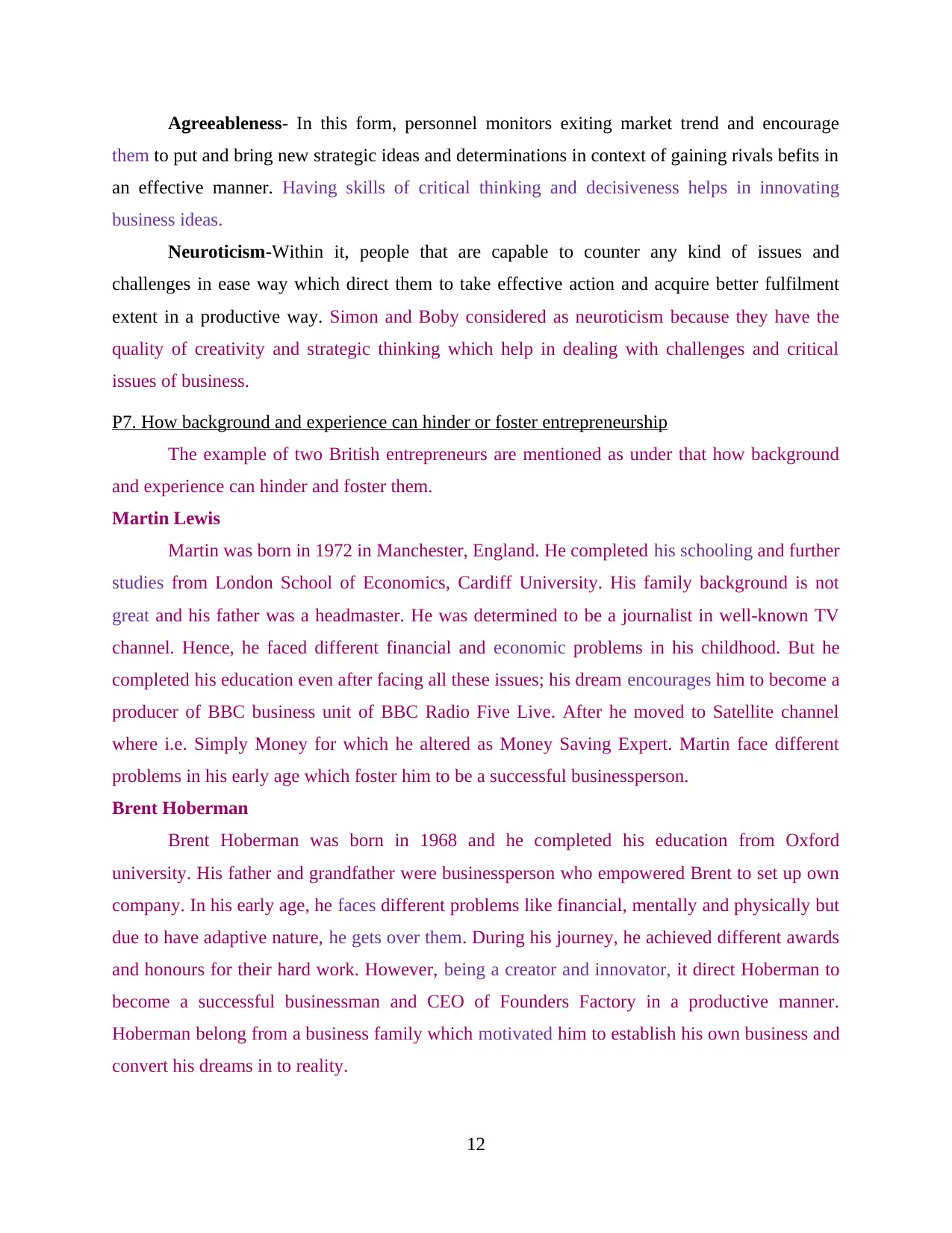
Agreeableness- In this form, personnel monitors exiting market trend and encourage
them to put and bring new strategic ideas and determinations in context of gaining rivals befits in
an effective manner. Having skills of critical thinking and decisiveness helps in innovating
business ideas.
Neuroticism-Within it, people that are capable to counter any kind of issues and
challenges in ease way which direct them to take effective action and acquire better fulfilment
extent in a productive way. Simon and Boby considered as neuroticism because they have the
quality of creativity and strategic thinking which help in dealing with challenges and critical
issues of business.
P7. How background and experience can hinder or foster entrepreneurship
The example of two British entrepreneurs are mentioned as under that how background
and experience can hinder and foster them.
Martin Lewis
Martin was born in 1972 in Manchester, England. He completed his schooling and further
studies from London School of Economics, Cardiff University. His family background is not
great and his father was a headmaster. He was determined to be a journalist in well-known TV
channel. Hence, he faced different financial and economic problems in his childhood. But he
completed his education even after facing all these issues; his dream encourages him to become a
producer of BBC business unit of BBC Radio Five Live. After he moved to Satellite channel
where i.e. Simply Money for which he altered as Money Saving Expert. Martin face different
problems in his early age which foster him to be a successful businessperson.
Brent Hoberman
Brent Hoberman was born in 1968 and he completed his education from Oxford
university. His father and grandfather were businessperson who empowered Brent to set up own
company. In his early age, he faces different problems like financial, mentally and physically but
due to have adaptive nature, he gets over them. During his journey, he achieved different awards
and honours for their hard work. However, being a creator and innovator, it direct Hoberman to
become a successful businessman and CEO of Founders Factory in a productive manner.
Hoberman belong from a business family which motivated him to establish his own business and
convert his dreams in to reality.
12
them to put and bring new strategic ideas and determinations in context of gaining rivals befits in
an effective manner. Having skills of critical thinking and decisiveness helps in innovating
business ideas.
Neuroticism-Within it, people that are capable to counter any kind of issues and
challenges in ease way which direct them to take effective action and acquire better fulfilment
extent in a productive way. Simon and Boby considered as neuroticism because they have the
quality of creativity and strategic thinking which help in dealing with challenges and critical
issues of business.
P7. How background and experience can hinder or foster entrepreneurship
The example of two British entrepreneurs are mentioned as under that how background
and experience can hinder and foster them.
Martin Lewis
Martin was born in 1972 in Manchester, England. He completed his schooling and further
studies from London School of Economics, Cardiff University. His family background is not
great and his father was a headmaster. He was determined to be a journalist in well-known TV
channel. Hence, he faced different financial and economic problems in his childhood. But he
completed his education even after facing all these issues; his dream encourages him to become a
producer of BBC business unit of BBC Radio Five Live. After he moved to Satellite channel
where i.e. Simply Money for which he altered as Money Saving Expert. Martin face different
problems in his early age which foster him to be a successful businessperson.
Brent Hoberman
Brent Hoberman was born in 1968 and he completed his education from Oxford
university. His father and grandfather were businessperson who empowered Brent to set up own
company. In his early age, he faces different problems like financial, mentally and physically but
due to have adaptive nature, he gets over them. During his journey, he achieved different awards
and honours for their hard work. However, being a creator and innovator, it direct Hoberman to
become a successful businessman and CEO of Founders Factory in a productive manner.
Hoberman belong from a business family which motivated him to establish his own business and
convert his dreams in to reality.
12
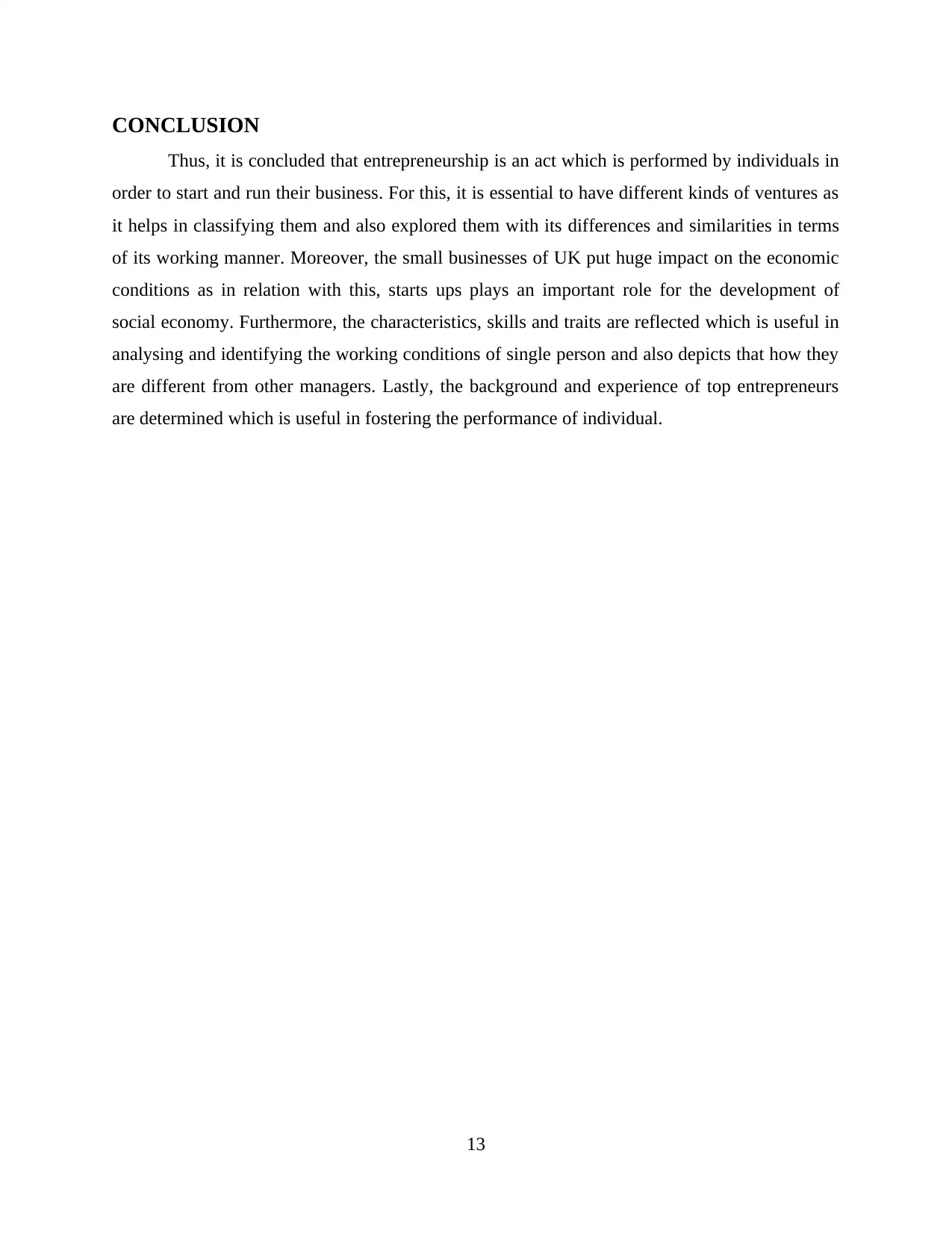
CONCLUSION
Thus, it is concluded that entrepreneurship is an act which is performed by individuals in
order to start and run their business. For this, it is essential to have different kinds of ventures as
it helps in classifying them and also explored them with its differences and similarities in terms
of its working manner. Moreover, the small businesses of UK put huge impact on the economic
conditions as in relation with this, starts ups plays an important role for the development of
social economy. Furthermore, the characteristics, skills and traits are reflected which is useful in
analysing and identifying the working conditions of single person and also depicts that how they
are different from other managers. Lastly, the background and experience of top entrepreneurs
are determined which is useful in fostering the performance of individual.
13
Thus, it is concluded that entrepreneurship is an act which is performed by individuals in
order to start and run their business. For this, it is essential to have different kinds of ventures as
it helps in classifying them and also explored them with its differences and similarities in terms
of its working manner. Moreover, the small businesses of UK put huge impact on the economic
conditions as in relation with this, starts ups plays an important role for the development of
social economy. Furthermore, the characteristics, skills and traits are reflected which is useful in
analysing and identifying the working conditions of single person and also depicts that how they
are different from other managers. Lastly, the background and experience of top entrepreneurs
are determined which is useful in fostering the performance of individual.
13
Secure Best Marks with AI Grader
Need help grading? Try our AI Grader for instant feedback on your assignments.
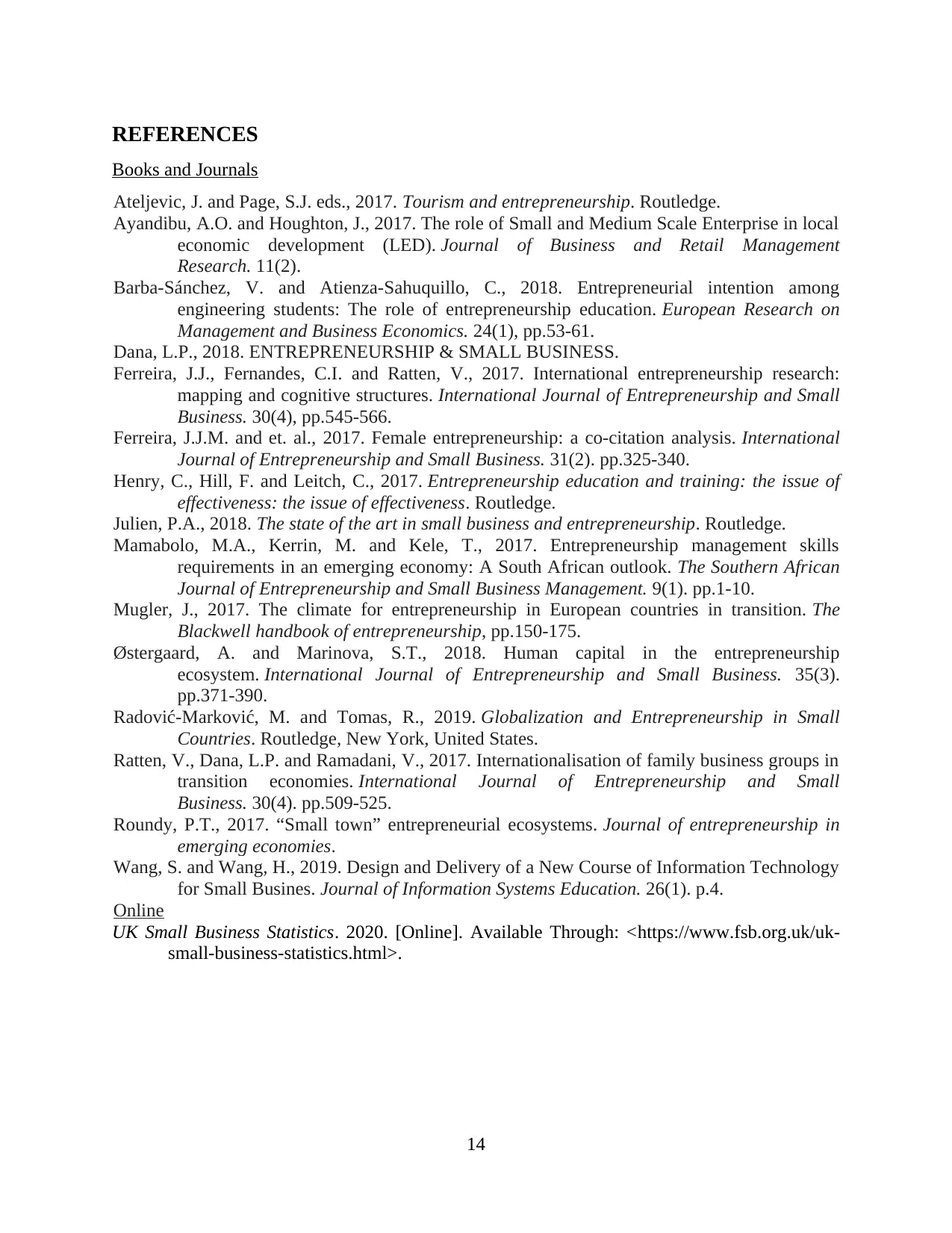
REFERENCES
Books and Journals
Ateljevic, J. and Page, S.J. eds., 2017. Tourism and entrepreneurship. Routledge.
Ayandibu, A.O. and Houghton, J., 2017. The role of Small and Medium Scale Enterprise in local
economic development (LED). Journal of Business and Retail Management
Research. 11(2).
Barba-Sánchez, V. and Atienza-Sahuquillo, C., 2018. Entrepreneurial intention among
engineering students: The role of entrepreneurship education. European Research on
Management and Business Economics. 24(1), pp.53-61.
Dana, L.P., 2018. ENTREPRENEURSHIP & SMALL BUSINESS.
Ferreira, J.J., Fernandes, C.I. and Ratten, V., 2017. International entrepreneurship research:
mapping and cognitive structures. International Journal of Entrepreneurship and Small
Business. 30(4), pp.545-566.
Ferreira, J.J.M. and et. al., 2017. Female entrepreneurship: a co-citation analysis. International
Journal of Entrepreneurship and Small Business. 31(2). pp.325-340.
Henry, C., Hill, F. and Leitch, C., 2017. Entrepreneurship education and training: the issue of
effectiveness: the issue of effectiveness. Routledge.
Julien, P.A., 2018. The state of the art in small business and entrepreneurship. Routledge.
Mamabolo, M.A., Kerrin, M. and Kele, T., 2017. Entrepreneurship management skills
requirements in an emerging economy: A South African outlook. The Southern African
Journal of Entrepreneurship and Small Business Management. 9(1). pp.1-10.
Mugler, J., 2017. The climate for entrepreneurship in European countries in transition. The
Blackwell handbook of entrepreneurship, pp.150-175.
Østergaard, A. and Marinova, S.T., 2018. Human capital in the entrepreneurship
ecosystem. International Journal of Entrepreneurship and Small Business. 35(3).
pp.371-390.
Radović-Marković, M. and Tomas, R., 2019. Globalization and Entrepreneurship in Small
Countries. Routledge, New York, United States.
Ratten, V., Dana, L.P. and Ramadani, V., 2017. Internationalisation of family business groups in
transition economies. International Journal of Entrepreneurship and Small
Business. 30(4). pp.509-525.
Roundy, P.T., 2017. “Small town” entrepreneurial ecosystems. Journal of entrepreneurship in
emerging economies.
Wang, S. and Wang, H., 2019. Design and Delivery of a New Course of Information Technology
for Small Busines. Journal of Information Systems Education. 26(1). p.4.
Online
UK Small Business Statistics. 2020. [Online]. Available Through: <https://www.fsb.org.uk/uk-
small-business-statistics.html>.
14
Books and Journals
Ateljevic, J. and Page, S.J. eds., 2017. Tourism and entrepreneurship. Routledge.
Ayandibu, A.O. and Houghton, J., 2017. The role of Small and Medium Scale Enterprise in local
economic development (LED). Journal of Business and Retail Management
Research. 11(2).
Barba-Sánchez, V. and Atienza-Sahuquillo, C., 2018. Entrepreneurial intention among
engineering students: The role of entrepreneurship education. European Research on
Management and Business Economics. 24(1), pp.53-61.
Dana, L.P., 2018. ENTREPRENEURSHIP & SMALL BUSINESS.
Ferreira, J.J., Fernandes, C.I. and Ratten, V., 2017. International entrepreneurship research:
mapping and cognitive structures. International Journal of Entrepreneurship and Small
Business. 30(4), pp.545-566.
Ferreira, J.J.M. and et. al., 2017. Female entrepreneurship: a co-citation analysis. International
Journal of Entrepreneurship and Small Business. 31(2). pp.325-340.
Henry, C., Hill, F. and Leitch, C., 2017. Entrepreneurship education and training: the issue of
effectiveness: the issue of effectiveness. Routledge.
Julien, P.A., 2018. The state of the art in small business and entrepreneurship. Routledge.
Mamabolo, M.A., Kerrin, M. and Kele, T., 2017. Entrepreneurship management skills
requirements in an emerging economy: A South African outlook. The Southern African
Journal of Entrepreneurship and Small Business Management. 9(1). pp.1-10.
Mugler, J., 2017. The climate for entrepreneurship in European countries in transition. The
Blackwell handbook of entrepreneurship, pp.150-175.
Østergaard, A. and Marinova, S.T., 2018. Human capital in the entrepreneurship
ecosystem. International Journal of Entrepreneurship and Small Business. 35(3).
pp.371-390.
Radović-Marković, M. and Tomas, R., 2019. Globalization and Entrepreneurship in Small
Countries. Routledge, New York, United States.
Ratten, V., Dana, L.P. and Ramadani, V., 2017. Internationalisation of family business groups in
transition economies. International Journal of Entrepreneurship and Small
Business. 30(4). pp.509-525.
Roundy, P.T., 2017. “Small town” entrepreneurial ecosystems. Journal of entrepreneurship in
emerging economies.
Wang, S. and Wang, H., 2019. Design and Delivery of a New Course of Information Technology
for Small Busines. Journal of Information Systems Education. 26(1). p.4.
Online
UK Small Business Statistics. 2020. [Online]. Available Through: <https://www.fsb.org.uk/uk-
small-business-statistics.html>.
14
1 out of 17
Related Documents
Your All-in-One AI-Powered Toolkit for Academic Success.
+13062052269
info@desklib.com
Available 24*7 on WhatsApp / Email
![[object Object]](/_next/static/media/star-bottom.7253800d.svg)
Unlock your academic potential
© 2024 | Zucol Services PVT LTD | All rights reserved.





